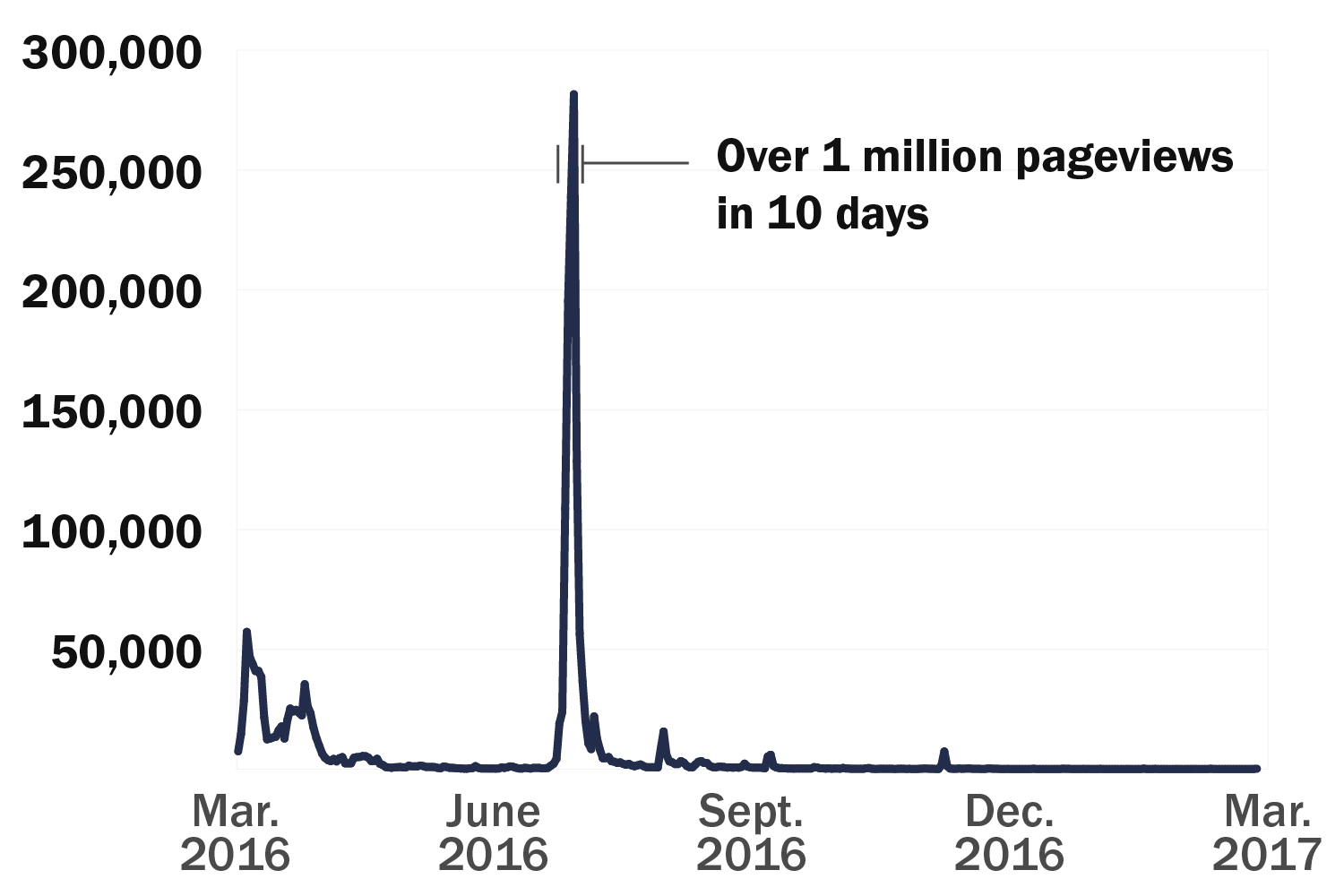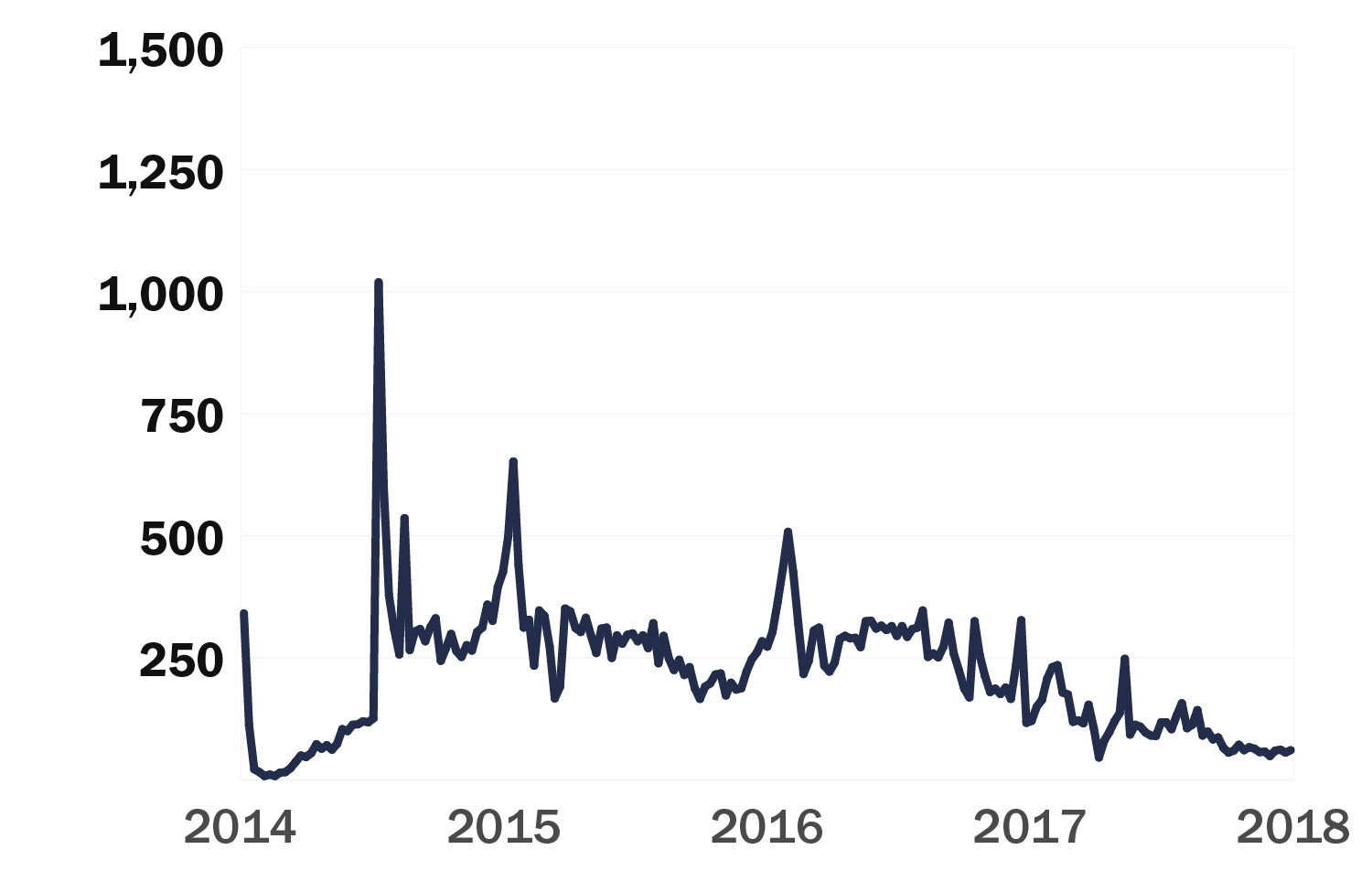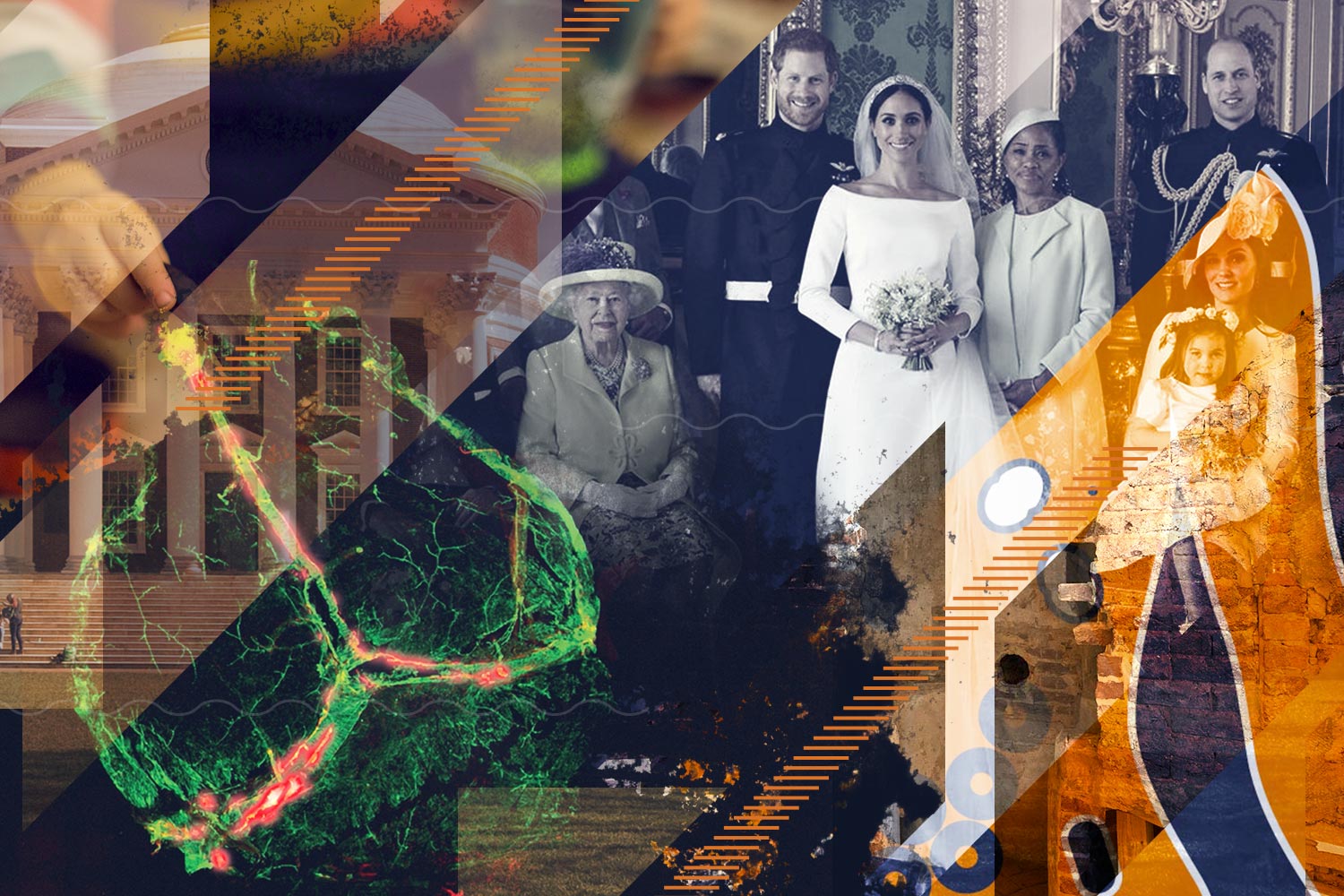Every day, we share the University of Virginia’s stories with you on this site, in our Daily Report email, or on Facebook, Twitter and Instagram.
Each story reveals something important about UVA. But the fact is, some of them receive more interest than others. There are always a few that light up our Facebook feed or send a spike through our web analytics.
Which stories those are says as much about our audience and the way we all consume media as it does about our University. What do you click on? Why do you click on it? How do you find it? And, why is that important?
We chose 10 of our most-read UVA Today stories over the past five years – excluding crisis communications – and asked two of UVA’s digital marketing and social media experts to point out some key trends. While pageview numbers don’t necessarily indicate a story’s overall value, this list provides some insight into what you as an audience enjoy reading. Check it out.
Medical Breakthroughs “Break the Internet”
The date was July 14, 2016. A pretty normal Thursday – at least until a story began piling up more than 100,000 views, on its way to more than 2 million, a huge spike for any publication. The story was “They’ll Have to Rewrite the Textbooks,” and, for UVA Today at least, it was the one that “broke the internet,” far and away our most-read story of all time.
The story chronicled Dr. Jonathan Kipnis’ 2015 discovery of previously unknown vessels connecting the brain to the immune system, which has life-changing implications for neurological diseases ranging from autism to Alzheimer’s disease. It has garnered 2,245,435 pageviews – and counting.
A large part of that traffic, of course, was due to the once-in-a-lifetime medical breakthrough the story shared. However, Facebook also had a lot to do with the story’s performance. More than 2 million of the total 2.2 million pageviews came from the social media giant, many from Facebook groups for parents and families facing autism or other neurological diseases.
“They’ll Have to Rewrite the Textbooks” Pageviews

"They'll Have to Rewrite the Textbooks" received over 1 million pageviews in a 10 day period during July 2016.
“Facebook is the most significant amplifier of what we might call news,” said Siva Vaidhyanathan, UVA’s Robertson Professor of Modern Media Studies, and the author of a new book, “Antisocial Media: How Facebook Disconnects Us and Undermines Democracy.”
“It has more than 2.2 billion users, 220 million in the U.S.,” he said. “No other outlet comes close.”
And when people are on Facebook, Vaidhyanathan said, they like stories that feel just as relevant to their lives as their friends or family members’ updates – maybe even more so.
“Health-related stories have done very well since the beginning of Facebook,” he said. “Facebook is a very personal experience for most users, and health is a very personal thing.”
Another recent health care story, from Dr. John Lukens' lab, also ranked highly on our list: “Autism Risk Determined by Health of Mom’s Gut.” This one garnered 66,063 pageviews and got heavy traffic on Facebook, though far less than its 2016 counterpart. That is in part because Facebook’s algorithm changes, introduced in January, favor content from individual users as opposed to brands or institutions, including UVA. More on that in a minute.
Numbers and Rankings Make You Hit “Share”
Stories about various University rankings tend to do very well – maybe just as well as UVA itself does in the rankings. One, “Forbes Names UVA Nation’s Second Highest-Ranking Public University,” got 48,003 pageviews. Another U.S. News & World Report ranking garnered 41,761. And those are just two of many examples.
As Darden School of Business marketing professor Rajkumar Venkatesan describes it, ranking stories do well because rankings are a form of “social currency” for UVA students, alumni and community members.
“People click on, comment on and share rankings stories when they reflect well on them and offer some social currency,” Venkatesan said. He likened it to reaching a new level in a video game – “it provides a sense of reward, especially for alumni.”
All of that interaction – particularly comments and shares – plays well with the new Facebook algorithm we mentioned. As Vaidhyanathan explains it, the algorithm favors posts that a lot of people comment on, assuming that people will comment on posts that are relevant to them and provoke good discussion.
“Mark Zuckerberg decided that just clicking or sharing a story was not good enough, and the company redesigned its algorithm to favor comments over all other sources of engagement,” Vaidhyanathan said.
The changes were instituted as a partial response to allegations that Facebook allowed fake news and other harmful content to run rampant on its site. However, Vaidhyanathan said it is an imperfect solution at best.
“The goal was to promote ‘meaningful’ content, but Facebook never defined what ‘meaningful’ means,” he said. “We are actually seeing that controversy, more than depth or positive stories, now draws more traffic.”
Some Stories Hit Close to Home
Much like health care stories, stories about child development and parenting tend to attract large audiences. Two stories sharing research from UVA’s psychology department and the Curry School of Education did particularly well with our audience. “Put Aside Those Toys: Your Kids Want the Real Deal,” showing that children prefer real activities to pretend play, registered 39,707 pageviews. Another story, “Overnights Away from Home Affect Children’s Attachments, Study Shows,” – earned 39,200.
Again, these stories do well because any parent, or anyone recalling their own childhood, can relate and talk about them. They also make for interesting dinner party conversation.
“People want to click on something that is relevant to their lives,” Venkatesan said. “They also like to share stories that fit into good conversations – information that they can share with friends or family, or in social situations.”
Some Stories Just Tug at Your Heartstrings
When Brandon Rogers, a new doctor and aspiring singer, was killed in a car accident on June 10, 2017, the UVA community lost an outstanding alumnus who had made an outsized impact on the world. Not only had the 29-year-old recently started his first year of residency at Riverside Brentwood Medical Center in Newport News, he had also wowed judges on “America’s Got Talent” and lived out a dream singing with Boyz II Men in Las Vegas.
Shortly after his death, UVA Today spoke with Rogers’ tight-knit group of UVA friends to learn more about him and share his life with the wider UVA community.
Such stories are emotional to report and to read. Rogers’ story, “Remembering Brandon Rogers, the Doctor Who was Ready for the Big Stage,” powerfully touched UVA Today’s audience, landing near the top of our pageviews list with 73,202 views and testifying to Rogers’ remarkable impact.
Interestingly, the largest chunk of those views – about 27,000 of them – came from “direct” traffic, meaning visits that our web tracking software cannot attribute to a specific source. Often this category includes text message or email links, as one reader shares the article with a friend. In this case, Rogers’ friends and family likely shared his story in text messages, email chains and large messaging groups like WhatsApp.
“It was a powerful story, and people amplified its message by sending it directly to others,” Venkatesan said.
In the end, Rogers’ friends and family drove tens of thousands of people to learn more about his life.
Perfectly Google-able Headlines Draw You In
Have you ever wondered why Edgar Allan Poe wrote “Quoth the raven, nevermore” in his famous poem, “The Raven”? So, it turns out, have many other people.
The headline on this story about one of UVA’s most famous drop-outs – “Why Did Poe Write, ‘Quoth the Raven, Nevermore’?” – is a near exact match for a popular Google query about the poem.
Accordingly, nearly 44,000 of the story’s 48,745 pageviews come directly from Google. The search engine regularly registers as one of the site’s top traffic drivers, but not usually at that overwhelming percentage. What’s more, the views did not come all at once, like they would with social media or email traffic, but rather in a slow, steady drip over the years as thousands of different people have asked Google about Poe’s most iconic poem.
“Why Did Poe Write, ‘Quoth the Raven, Nevermore’?" Pageviews

Traffic to this story did not come in one large spike, but in a steady stream of Google traffic week after week after week.
It is a good example of search engine optimization, in which digital marketers tailor specific keywords and headlines to popular Google searches, making their page rank higher in Google’s search results.
You Can’t Resist Celebrities
Some of our most-clicked stories involve some pretty big names.
In January 2017, the “Two Blind Brothers” – UVA alumni Bradford and Bryan Manning, who both live with a degenerative eye disease and launched a clothing company supporting blindness research – went on “The Ellen DeGeneres Show.” They left with a $30,000 check and plenty of great publicity, including the 36,704 pageviews on their UVA Today story, “Ellen DeGeneres Had a Big Surprise for UVA’s ‘Two Blind Brothers.”
Another story had what you might call a royal flush: Two ’Hoos, two royals and tennis star Serena Williams. Religious studies professor Charles Marsh and alumnus and tech entrepreneur Alexis Ohanian played noteworthy roles in May as Britain’s Prince Harry wed American actress Meghan Markle. Marsh’s friend, the Most Rev. Michael Curry, quoted the professor’s book in his stirring sermon. Ohanian, who co-founded the online hub Reddit while at UVA, was there to hear it, accompanying his wife, Williams, to see her good friend, Markle, say her vows. The UVA Today story chronicling those royal Wahoo connections – “Did You Spot the UVA Connections in Saturday’s Royal Wedding?” – earned 27,437 pageviews.
Venkatesan attributed the success of such celebrity-driven stories to the thrill that comes from having a personal connection with the rich and famous, even if only online.
“Again, it is a kind of social currency,” he said.
Big UVA News – Especially if it is Announced From the Rotunda – Will Always Be a Hit
Of course, some of our biggest numbers also come from some of UVA’s biggest news.
The 2015 rediscovery of a previously lost chemistry hearth within the Rotunda during the massive Rotunda restoration prompted widespread fascination and 37,594 pageviews for the UVA Today story, “Jeffersonian-Era Chemistry Hearth Preserved in Rotunda Wall.”
Naturally, the Sept. 15, 2017 announcement of Jim Ryan as UVA’s ninth president also generated a lot of readership. More than 36,164 of you visited the breaking news announcement, “Board of Visitors Selects James E. Ryan as University of Virginia’s Next President,” on UVA Today that day.
“News like that will be a good conversation-starter among UVA alumni, of course, and those who know about it first get the pleasure of passing along to their friends,” Venkatesan said.
Vaidhyanathan agreed, noting that such stories also generate a lot of activity among Facebook users, in turn prompting the story to creep higher in the company’s algorithm.
“Those announcements will usually generate a lot of clicks, likes and shares, which will in turn be amplified by Facebook’s algorithm,” he said. “Members of the UVA community love to share in proud moments for the UVA community.”
Media Contact
Article Information
September 14, 2018
/content/10-our-most-read-stories-all-time-and-why-you-clicked-them

